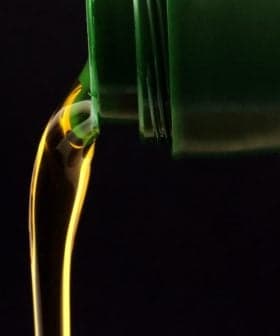Half of 26 Olive Oils Tested 'Defective' in Germany
An independent consumer protection organization in Germany, Stiftung Warentest, found that half of the “extra virgin” olive oils tested contained pesticides and other carcinogenic impurities, leading to concerns about the safety and quality of olive oil in the country. Despite the troubling results, the organization still encourages the consumption of olive oil, but calls for better supervision and tighter controls to ensure the quality of the product.
German consumers and sellers of olive oil have been shocked ever since an independent and highly regarded consumer protection organization, Stiftung Warentest (SW), had a panel of expert tasters scrutinize 26 varieties of “extra virgin” and found half of them wanting. But not so badly as to be dangerous to health, they maintained, though some contained pesticides and other carcinogenic impurities.
The results of the test were published in the February edition of Stiftung Warentest’s magazine, Test, and received extensive print, broadcast and online publicity across Germany.
Olive oil at the moment has an image problem. That’s unfortunate because it’s actually a very healthy and tasty food.
The testers worked according to EU regulation No. 2568/91“on the characteristics of olive oil and olive-residue oil and on the relevant methods of analysis.” Among other things, those rules state: “Where it is found that an oil does not correspond to its category description, the Member State shall, without prejudice to any other penalties, apply effective, proportionate and dissuasive penalties to be determined in the light of the seriousness of the irregularity detected.”
Germans have taken to olive oil, regarding it as healthy and importing most of what they consume from Italy and Spain. Only one tested oil was rated ‘good’: O‑Med Picual extra virgin olive oil from Spain, costing €40 ($43.58) per liter and available only from specialty retailers and online. Four out of six organic oils were marked “deficient.”
The EU rules for the extra virgin grade require the taste and aroma must be flawless and there needs to be a minimum level of fruitiness. The rules set maximum levels of chemical residues and precise language, category and origin information on labels. The test results showed there’s no relying on any of that.

Thirteen of the 26 samples failed the extra virgin criteria. Five from Portugal and Greece were highly polluted with mineral oil hydrocarbons, possibly traceable to motor fumes, technical oils and pure paraffin (the EU allows paraffin as a plant protectant, including in organic farming). The testers also found plasticizers, pesticides (in 20 of the samples), polycyclic aromatic hydrocarbons and styrene.
The Berlin-based Foodwatch organization demanded that producers and sellers take the olive oils polluted with mineral oil off the market and stop sales immediately. The tainted oils are a serious health risk, Foodwatch argued, demanding lawmaking action. “Given the many proven instances of dangerous mineral oil in foods the federal government must explain why it still refuses to take action to protect consumers. Obviously, the food industry hasn’t got a grip on the problem. There has to be zero tolerance for the especially critical aromatic mineral oils.”
Stiftung Warentest laboratory analyses found the origins of five oils falsely declared: four wrongly naming Italy as the source country, one Spain. Seven oils didn’t meet flavor standards, tasting moldy, pricked, rancid and even worm-eaten. Four oils costing from €14.20 to €20 per liter were rated “satisfactory.” The cheapest oil tested cost €5.35.
Olive oil is probably the most frequently manipulated agricultural product, commented Silke Schwartau, nutrition expert at the Hamburg consumer center. It’s almost impossible for consumers to know what’s in the bottle, she said. “Olive oil at the moment has an image problem. That’s unfortunate because it’s actually a very healthy and tasty food.”
The Stiftung Warentest examiners don’t want people to completely eschew olive oil, either. Better supervision and tighter controls would help, said Schwartau.
Due to its established reputation as an independent and reliable organization, the foundation has a considerable influence on the buying behavior of consumers. Good ratings and verdicts are often given great prominence in product advertising and on product packaging.
In contrast, bad ratings and verdicts frequently lead to a decline in sales and thus sometimes legal action against SW by the manufacturers. According to SW, they are sued, on average, ten times each year. The foundation has never actually been ordered by the courts to pay compensation and usually wins legal actions taken against it.









